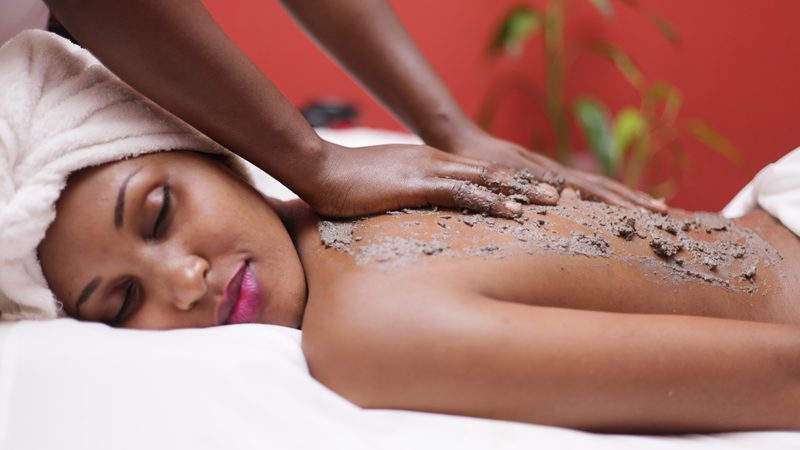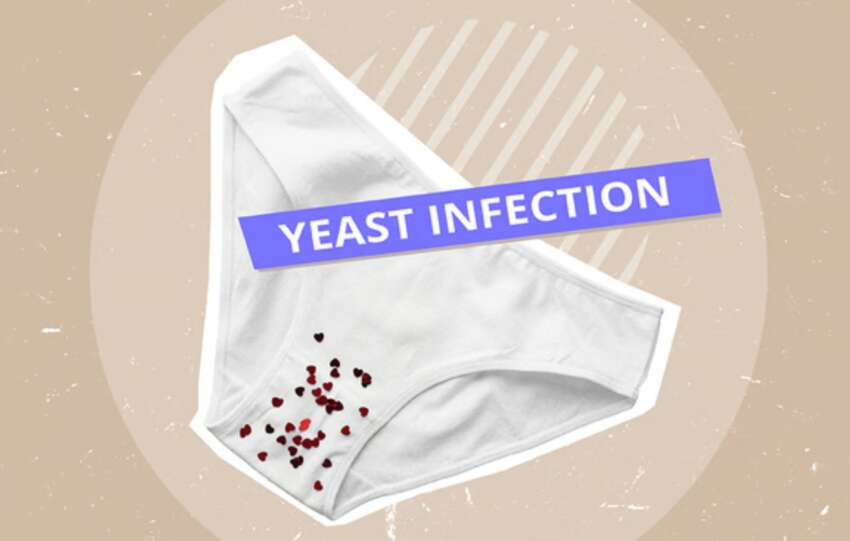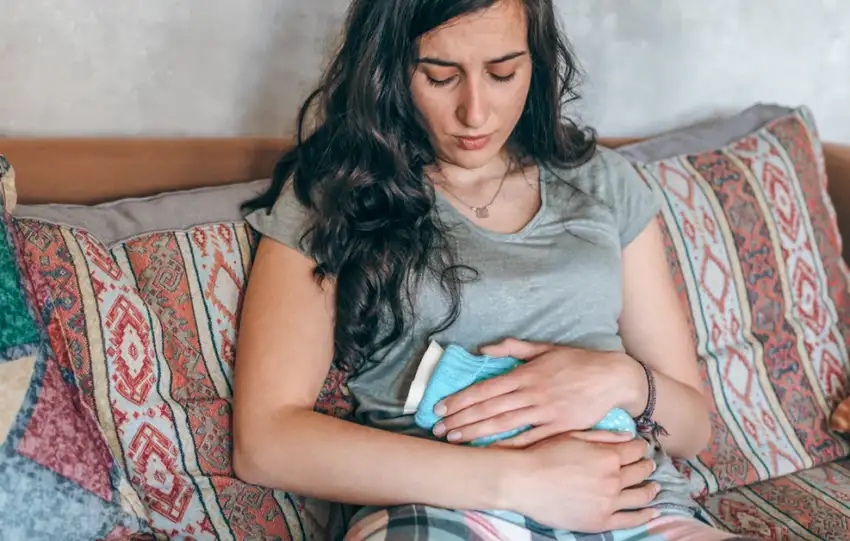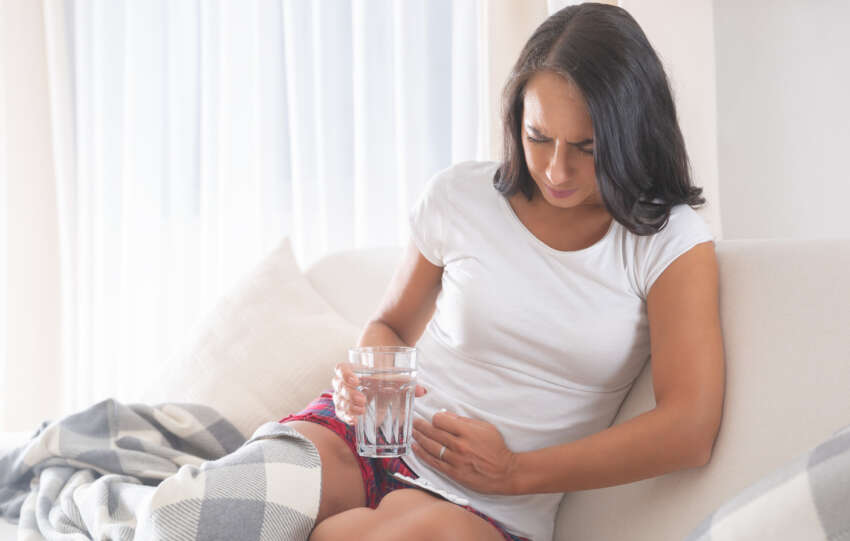PCOS ( Polycystic Ovary Syndrome) is a hormonal disorder that affects nearly 1 in 10 women of reproductive age. It is a very complex condition in which women’s ovaries and reproductive systems are affected. The ovaries are the female reproductive gland that produces eggs and hormones. Women that are affected by PCOS have enlarged ovaries and small cysts developed in their ovaries. Cysts are basically small sacs filled with fluids. The cysts interfere with the proper development of eggs to move towards irregular periods and create problems in conceiving.
Common Symptoms of PCOS
The Most Common Symptoms of PCOS are the following:
- Irregular Periods
- Acne
- Infertility
- Hair Loss
- Weight Gain
- Ovarian cysts
- Hirsutism
- Increased risk of diabetes
- Hormone Imbalance
- Skin Discoloration
Read more: Herbal Tea for Menstrual Cramps and Bloating
Irregular Periods

A crucial sign of PCOS is irregular periods and missed periods. The main reason for irregular menstrual periods is monthly ovulation does not occur on time. The average period cycle is 28 days long, but women who suffer from PCOS may have cycles of 12 to 40 days or longer. And many women have less than four menstrual in a year. Many women face heavy periods that are longer than normal periods of length. The androgen male hormone is the key factor for irregular menstrual periods in women. The irregular periods increased the risk of infertility.
Acne
PCOS can cause acne because the male hormone androgen is produced in ovaries increase the production of oil in the skin and cause acne on the face and other body parts lining the neck, shoulder, and chest. PCOS acne usually appears on the lower face, jawline, and neck rather than the T-zone common in adolescent acne.
Infertility
PCOS can cause the formation of cysts in ovaries, which disrupts the normal process of ovulation or the absence of ovulation, which can lead to moving to infertility. Most women with PCOS experience infertility due to ovulation problems. A rise in testosterone production or non-maturing follicles on the ovaries may prevent ovulation.PCOS women have low grades of chronic formation which affect the egg quality and have low chances of fertilization and implantation.
Related: Reasons for having Headache During Pregnancy
Hair Loss
Another symptom of PCOS is hair loss. Due to excess androgenic hormones, PCOS often leads to thinning hair and hair loss, as well as limp, lackluster hair that breaks easily and is dry and damaged. Most hair falls out on the sides and front of the head. In the parietal area, the hair becomes much thinner. Above the temples, the hairline recedes. PCOS causes more hair loss on a daily basis, and you see more hair on clothes, or on furniture than normal. You can notice hair brunch come out during the shower.
Weight Gain
Women who suffer from PCOS have insulin resistance issues. Insulin helps to break down fat and protein in the body and convert them into energy that helps to maintain blood sugar levels in the blood. But in contrast, insulin resistance prevents the body from absorbing sugar or glucose, which builds up instead in the bloodstream. As insulin levels rise in the body, the ovaries produce excessive amounts of the male hormone androgen. Women with PCOS have apple-shaped bodies instead of pear-shaped ones. Mostly fat around the abdomen considers more dangerous and causes many heart and pregnancy problems.
Ovarian Cysts
The small fluid sacs that are present in the ovaries. These are very common and in every woman, cysts are developed in their life. Most cysts are harmless and they disappear themselves. But if women have PCOS as well as cysts face infertility issues and difficulty to get pregnant. Ovarian cysts can be seen with the help of ultrasound and further medical processes start on the basis of size and appearance, the cyst can range from small to large, and patients feel pain in the pelvic area.
Hirsutism
The most common symptom of PCOS is hirsutism. It is extra hair growth on the face and body, like in men. It is a medical disorder in which females produce more male hormones known as androgen which is the main reason for this problem. In the world, 10% of women are affected by this problem.
Increased Risk of Diabetes
More than half of women with PCOS develop type 2 diabetes by the age of forty, especially if they are overweight. Because they have already an insulin resistance problem. Their bodies produce insulin, but the body can use it properly, which increases the risk of type-2 diabetes. The high level of insulin triggers the increased production of testosterone in female ovaries that increases many other problems like irregular periods, weight gain, etc.
Hormone Imbalance
PCOS causes hormone fluctuation in the female body, PCOS produces a high level of male hormones known as androgen that cause irregular periods and many infertility issues. The male hormone testosterone is produced in negligible amounts in females but women which have PCOS have a high level of testosterone hormone. PCOS females have a high level of prolactin hormone.
Must Visit: pregnancy period in women | Physical And Emotional Changes
Skin Discoloration
Teenagers with PCOS have increased insulin levels in their blood. Darker skin areas can result from higher insulin levels on the back of the neck, beneath the arms, and in the groin. This condition is called acanthosis nigricans. Another name for it is hyperpigmentation.
How to Cure PCOS Naturally at Home?
PCOS can not be treated permanently, but you can Cure PCOS Naturally at Home by following these steps:
- Proper Diet
- Beneficial Supplements
- Regular exercise and yoga
- Maintain Healthy Weight
- Reduce stress
- Proper sleep
Proper Diet
PCOS can be managed if you choose the right food for your daily life and avoid all sugary, preserved, and junk food. A balanced diet not only regulates your menstrual cycle but also helps to balance your hormones.
- Increase the intake of fresh green vegetables like Spanish, broccoli, peas, etc
- You can add fresh fruits to your diet instead of sweets.
- Add seafood to your food that helps to manage your PCOS.
- Increase the intake of magnesium. You can get magnesium from almonds, cashew, and banana.
- Increase the intake of food that is enriched with fiber, which improves your digestive system. Fiber richer foods are avocados, sprouts, beans, broccoli, etc.
- Stop taking coffee. You can use green tea to boost your energy instead of coffee. It helps in insulin resistance and also helps to lose weight.
- Use food that is full of iron like raisins, eggs, and Spanish. PCOS feel mostly face heavy bleeding through which a lot of blood is wasted during menstrual periods. So make sure you use iron richer food that prevents you from anemia.
Beneficial Supplements
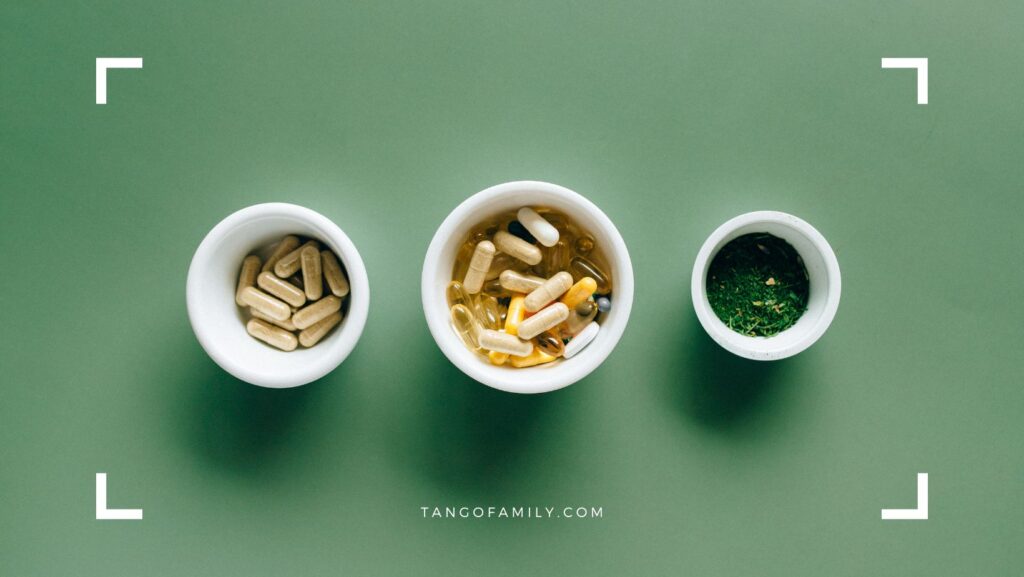
There are a number of supplements that claim to help with PCOS symptoms such as hormone regulation, insulin resistance, and inflammation. Make sure you consult your doctor before consuming it. But these herbs help you a lot to balance your hormone and periods:
- Cinnamon-It is very helpful for PCOS females. It is very helpful in insulin resistance as well as in regular periods. It is also very helpful to lose weight.
- Turmeric -Has positive effects on insulin resistance and acts as an inflammatory drug.
- Zinc – zinc also plays a very important role in managing PCOS. It can boost immunity and fertility rate in females. Unwanted hair growth is treatable with the help of zinc supplements.
- Vitamin D and calcium– it is a very important hormones for the endocrine system. In PCOS, females mostly face vitamin D deficiency. But both vitamin D and calcium are helpful for fertility and for regular periods.
- Vitamin B- It can boost fertility and also be very fruitful to control insulin resistance.
- Folate-Folate is a very important supplement that has very positive effects on exercise. the metabolic system of females.
Regular Exercise and Yoga
Regular exercise and yoga are very beneficial to manage PCOS. You should select a simple exercise and yoga for a healthy uterus and reproductive system. Walking, jogging and cycling are the best exercise for PCOS females. These are very helpful to reduce the risk of insulin resistance and type-2 diabetes.
Maintain Healthy Weight
A healthy weight is very helpful to overcome the symptoms of PCOS. you can manage your weight with a healthy diet plan. If you are overweight then your condition becomes worse with gradual time. A healthy weight helps to regular your menstrual periods increase your fertility rate and lower the risk of type-2 diabetes.
Reduce Stress
PCOS itself cause stress when PCOS female face excessive facial hair, irregular periods, weight gain, and many more. But you need to manage your stress because stress makes PCOS worse. It can move towards depression and anxiety. Stress badly affects your hormones and you face hormonal imbalance problems. So for avoiding stress you should try yoga and those activities in which you feel joy.
Proper Sleep
To manage PCOS proper sleep is very important you should take 8-9 hours of sleep daily. Avoid fatty food junk before going to bed. Make a proper bedtime routine. sleep reduces your stress level which helps to manage it directly or indirectly PCOS.
Conclusion
PCOS has very worse effects on the female reproductive system as well as they face many issues like irregular periods, excessive hair growth, infertility, weight gain, and many more. All issues are resolved naturally if you adopt a healthy lifestyle and manage your diet and take health supplements. It can not cure permanently it can be only managed.
